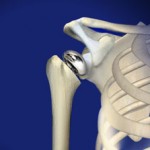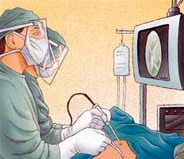Shoulder Surgery Information
 Your shoulder is the most flexible joint in your body. It allows you to place and rotate your arm in many positions in front, above, to the side, and behind your body. This flexibility also makes your shoulder susceptible to instability and injury.
Your shoulder is the most flexible joint in your body. It allows you to place and rotate your arm in many positions in front, above, to the side, and behind your body. This flexibility also makes your shoulder susceptible to instability and injury.
Depending on the nature of the problem, nonsurgical methods of treatment often are recommended before surgery. However, in some instances, delaying the surgical repair of a shoulder can increase the likelihood that the problem will be more difficult to treat later. Early, correct diagnosis and treatment of shoulder problems can make a significant difference in the long run.
Types of Shoulder Replacement Surgery
You may be given the option to have an arthroscopic procedure or an open surgical procedure.
Arthroscopy
 Arthroscopy allows the orthopaedic surgeon to insert a pencil-thin device with a small lens and lighting system into tiny incisions to look inside the joint. The images inside the joint are relayed to a TV monitor, allowing the doctor to make a diagnosis. Other surgical instruments can be inserted to make repairs, based on what is with the arthroscope. Arthroscopy often can be done on an outpatient basis. According to the American Orthopaedic Society for Sports Medicine, more than 1.4 million shoulder arthroscopies are performed worldwide each year.
Arthroscopy allows the orthopaedic surgeon to insert a pencil-thin device with a small lens and lighting system into tiny incisions to look inside the joint. The images inside the joint are relayed to a TV monitor, allowing the doctor to make a diagnosis. Other surgical instruments can be inserted to make repairs, based on what is with the arthroscope. Arthroscopy often can be done on an outpatient basis. According to the American Orthopaedic Society for Sports Medicine, more than 1.4 million shoulder arthroscopies are performed worldwide each year.
Open Surgery
Open surgery may be necessary and, in some cases, may be associated with better results than arthroscopy. Open surgery often can be done through small incisions of just a few inches.
Recovery and rehabilitation is related to the type of surgery performed inside the shoulder, rather than whether there was an arthroscopic or open surgical procedure.
Possible Complications after Surgery
There are always some risks with any surgery, even arthroscopic procedures. These include possible infection, and damage to surrounding nerves and blood vessels. However, modern surgical techniques and close monitoring have significantly minimized the occurrence of these problems.
After shoulder surgery, some pain, tenderness, and stiffness are normal. You should be alert for certain signs and symptoms that may suggest the development of complications.
> Fever after the second day following surgery
> Increasing pain or swelling
> Redness, warmth, or tenderness which may suggest a wound infection
> Unusual bleeding (some surgical wound drainage is normal and, in fact, desirable
> Numbness or tingling of the arm or hand
Dr. Keiser has shoulder patients from many different areas in and around Nebraska.
Omaha, Beatrice, Bellevue, Columbus, Fremont, Grand Island, Hastings, Kearney, La Vista, Lexington, Lincoln, Norfolk, North Platte, Papillion, Scottsbluff, South Sioux City.
